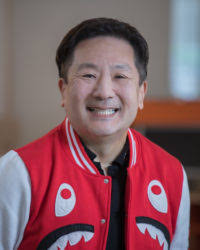The Biomedical HIV Prevention Summit’s Opening Plenary will look at the intersectionality of the #MeToo and HIV movements. Some may wonder why a meeting on HIV prevention would open with this issue? NMAC is committed to looking at how trauma impacts both HIV care and prevention. Ending the epidemic requires more than writing prescriptions. Just focusing on medications will not work. The implementation of PrEP has been very successful in certain communities but has also missed many who could benefit. There is still a racial divide to having an undetectable viral load. Ending the epidemic requires us to focus on more than pills. Our work needs to understand what motivates people to stay in care and adherent to their meds. Until we reach those communities that have proven to be elusive, our work will not end.
NMAC’s commitment to biomedical HIV prevention is personal. The agency pivots towards difficult to reach communities because it is the only way we will end the epidemic. These communities are in the DNA of NMAC. We must bring the promise of PrEP and U=U to all communities highly impacted by HIV.
Other plenaries examine the community’s plan titled Ending the HIV Epidemic in the US – A Roadmap for Federal Action. This document was just released on World AIDS Day. We will look at the U=U movement and how empowering people living with HIV is key to the individual’s and community’s health. Finally, we will look at health disparities among communities of color. These challenges hinder our efforts and must be prioritized.

Mario Perez
The meeting’s classroom sessions were curated by health departments, community-based organizations, advocates, and researchers. Topics were prioritized based on a comprehensive needs assessment. NMAC wants to thank Mario Perez and the Division of HIV and STD Programs, County of Los Angeles, Department of Public Health. In full disclosure, Mario is an NMAC board member. Not only did they raise money for scholarships and the Opening Reception, they also participated in the development of the Summit’s program. Ending the epidemic requires CBOs and health departments to work collaboratively. We thank LA Country for being a great collaborative partner.
Over 1,000 people will be at the JW Marriott at 900 West Olympic Blvd, LA, CA. The good news is that there is NO strike. The challenge is lots of people. Expect long lines. Use this time to network with your colleagues. Lines are built into the meeting as a way to build relationships that form the foundation for a movement. At least that sounds good.
Please download the Summit’s smartphone app. It will make navigation much easier. In our efforts to save paper and reduce costs, we are not printing a program book. You can get Summit information online via the app. You can find it in both the Apple App Store and the Android Play Store. Search for “2018 BHPS.”
This year we repeated our “Community Corner” where people can submit non-reviewed requests to make presentations at the meeting. Dr. Eugene McCray, the Director of the Division of HIV/ AIDS Prevention at the CDC will make one of these presentations.
The Opening Reception is Sunday evening at the loft in downtown LA (DTLA). Who knew they had lofts in LA? There is an evolution happening in DTLA to make it a walking city. In fact, NMAC recommends that you not rent a car, but use Lyft. There are multiple restaurants and shopping opportunities within walking distance of the hotel.
Summit Opening Reception, co-hosted by the Los Angeles Host Committee and NMAC.
Sunday, December 2, 2018
6:00 – 9:00 PM
Hudson Lofts
Lyft code for 20% off two rides: NMAC2018
1200 S Hope St, Los Angeles, 0.4 miles away from JW Marriott
Please pick up your conference badge at registration in hotel before arriving at the reception. Your badge will serve as your ticket for entry.
The Summit could not happen without the generous support of Gilead, Avita Pharmacy, Janssen, ViiV Healthcare, Kaiser Permanente, Walgreens, Human Rights Campaign and POZ. Their resources paid for 150 scholarships, travel, and hotel for faculty, and the resources needed to stage and organize the meeting. To be honest, registration fees barely cover the cost of food. This is the reality and cost of doing meetings. Our movement needs to meet in order to educate the frontlines, build relationships between communities in need, and set national goals for ending the epidemic.
The government can’t do it without community and community can’t do it without government. Understanding and working with this reality is central to our quest to end the HIV epidemic in America. The thought of working with this administration leaves many concerned, but the alternative of doing nothing is worse because every year we wait means more people will have to live with HIV. While living with HIV is definitely easier than it used to be, let’s not pretend it’s easy. Too many people living with the virus also live with isolation and depression. We have the science to end the epidemic, but do we have the political will and money to make it happen? The results of the 2018 midterm elections hopefully gives the HIV community access to more resources needed to make our dream of ending the epidemic real.
Yours in the struggle,

Paul Kawata
Paul Kawata
202.277.2777








Comments
Comments